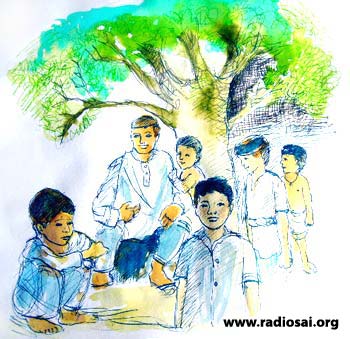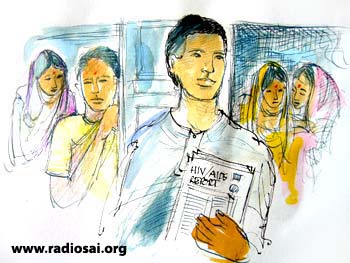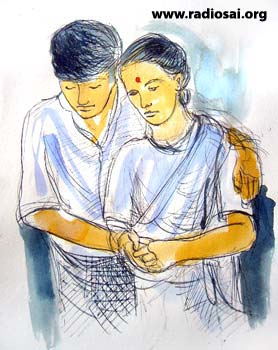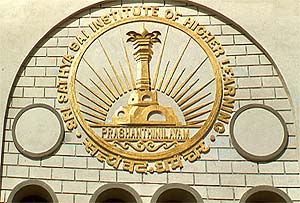 |
 |
 |
Volume
6 - Issue 11
NOVEMBER - 2008 |
HARNESSING THE HEART - PART 12
Living Up to the Challenge of Conscience in Daily Life
THE Zeal of the Heart
I completed my Masters in Financial Management from Sri Sathya Sai University (then Sri Sathya Sai Institute of Higher Learning) in 1999. This institution, as many are aware, provides education for not just living; it imparts lessons for life which enables students to live a complete life, and not merely exist. “Great dreams of great dreamers are always transcended.” ~ Dr. Abdul Kalam For my parents, my post graduate degree in management increased their dreams of my forthcoming financial wellbeing through a rewarding job in a leading business house. Though they were doing sufficiently well even to have supported me, their aspiration, like many other parents, was to see me successful in the corporate world. But my heart was somewhere else. My soul was already yearning to do something very different. Few people with my kind of academic background would have such ideas. Somehow, societal welfare always captured by imagination intensely, and so, my heart was set on looking for an opportunity in the non-profit sector. Yes, it was a very unlikely and economically unprofitable objective for a Post Graduate in Financial Management. While friends of my age and qualification were getting into leading banks and multi national corporations, I was frantically searching for a job that would satisfy my inner self. It was no walk in the park, and even more difficult for me because I had no clue about it, except that deep yearning within me. Two roads diverged in a wood, and I --
|
 |
Within nine months, I found something that interested me. I started working for a small Non-Government Organisation in Delhi as the Manager of a project that provided non-formal education and life skills to run-away children.
It also offered counselling to people affected by HIV. My typical day used to start with teaching a group of children, usually escapees from home, under a tree near Hazrat Nizamuddin Dargah in New Delhi, India’s capital city.
These boys were essentially rag-pickers and earned their bread by collecting all the trash that nobody liked to touch. They had absconded from their homes for various reasons, from petty issues like fighting with a sibling to being physically and psychologically abused by their drunkard fathers to unbearable hunger. Here I had the opportunity to interact with many such children, and they had come from various states of India.
I realised very soon that they were actually vulnerable to many evils of the society. In fact, this exposed me to many realities of life which I had not been exposed to, studying in the serene and protected environment of Sathya Sai institutions.
Nevertheless, my education at Bhagavan’s University had prepared me both physically and emotionally to understand and handle the situation.
The Power of Responsibility
Those days, I used to leave home at 6:00 a.m. in the morning to reach the railway station to mobilize the children, and then take them to our ‘education tree’ (which I used to fondly call Kalpavriksha!). This and the counselling to AIDS infected men and women used to be as fulfilling as they were challenging. Though in my formal education at Puttaparthi, I was not taught to do this, the emotional and spiritual training there had equipped me well to adapt to any role and strive for perfection.
This and the counselling to AIDS infected men and women used to be as fulfilling as they were challenging. Though in my formal education at Puttaparthi, I was not taught to do this, the emotional and spiritual training there had equipped me well to adapt to any role and strive for perfection. |
The sustained demonstration of this capability of mine actually enhanced the trust of the Director of this NGO; with time, he started entrusting me with higher responsibilities. I was asked to write funding proposals, interact with donors, and make presentations at meetings sponsored by the United Nations at a relatively young age. There were many senior people with degrees in social sciences and who had put in more years than me in that organisation, but my boss took me into confidence on important assignments. As months rolled by, my role in the organisation expanded.
Well, this was actually a tricky situation, because I ran the risk of incurring the wrath of all the seniors in the organisation who were overlooked. What saved me during this period were my people skills, for which the credit surely goes to my alma mater, Sri Sathya Sai University. It is in Puttaparthi that I had learnt the vital tips like always speaking obligingly, respecting elders, listening more than speaking and doing before speaking. Therefore, with time, I gained the confidence and cooperation of everyone in the organisation. And as we worked together, I could even at times transform their attitudes.
Management by Collaboration
Once our organisation took a decision to employ HIV positive persons to work with us, and I led this initiative. There were whispers of resistance in many corners of the organization, and I could see this evidently during my daily interactions with the staff. We were not a huge group, just about eight of us, and usually we used to have lunch together on one table, often sharing each other’s food. But now this was going to be difficult, I realised. So, again I took the initiative to break the ice. Through many positive plans, I ensured that the existing staff and these new recruits worked and ate together.
“Loneliness and the feeling of being unwanted are the most terrible poverty.”
~ Mother Teresa
 |
The only reason I could do this was Baba’s dictum: “Fullness in life is marked by the harmony of thought, word and deed.” During the counselling sessions conducted by our organisation, we used to emphasise strongly that HIV would not spread by touching each other or having food together, and I felt it was now for us to practice it. It did take a while, but then, slowly, we all became one family.
And now, after seven years, we are all still in touch with each other even though I have moved on from that organisation. In moments of solitude, when I look back, I realise that this ability to build teams and live harmoniously in communities has been one of my strengths right from my early days in school, which was reinforced during my 5 years stay in Baba’s University. In fact, this aspect of my personality is what has taken me far in life today.
While I was working in the above organisation, I also realized that if I have to improve my effectiveness in my chosen field of work, it would serve me better to pursue a formal education in the discipline of Social Development. I figured that all the courses offered were either for 2 or 3 years, and were quite elaborate; I was looking for one that was short, integrated and holistic.
My work experience till then had given me insight into “social work” in the corporate, voluntary as well as academic arenas. I was convinced that to better understand the wider context, influence, and mechanics of social work, I should study it with a lot more focus.
Learning to Lead
I came across an advertisement sent through email to over 600 NGOs in India inviting offers to recruit its professional students, well trained in NGO Management, for internship. Initially, I discarded the mail thinking there were several other Social Work schools that were more popular. But there was something within me that motivated me to visit the website of that institute. And thus, my first online interaction with EDI India (Entrepreneurship Development Institute of India) happened.
I joined the course in 2003 and I am happy I had made the right choice. A decision to leave a job and pursue a course is not an easy one, and I had weighed it against many realities like cost, duration and placement prospects. There are several institutes in India that offer a variety of such courses but to have found this course and getting enrolled was, in hindsight, indeed a wise decision. This course specifically aimed to groom the second line leadership in NGOs.
Voluntary organizations are often thought to be merely charitable organizations and the science behind managing these organizations is often neglected. Many such institutions are run by a single individual who bring in much social capital by their passion and personality, but once the person is no more in the scene, the organisation just withers away. Institutionalizing the practices, approaches, innovations and ideas require professionally trained people who can spearhead the challenges involved in the sector.
‘All labour that uplifts humanity has dignity and importance and should be undertaken with painstaking excellence.’
~ Martin Luther King, Jr.
I was following my heart and I knew God would always find a way for me. If there was a need for me to discontinue the course at that time to help my mother, I would have done it too, accepting it as God’s will. In whatever situation life put me in, I never forgot God. Prayer was and is an indelible part of my life, and this attitude of relying on none else but on the Supreme is another salient trait that I had imbibed in Sri Sathya Sai University, which has really stood me in great stead all my life. |
Once I embarked onto the social development sector after my education, many a time I had to face questions from my family, like ‘Is this really what you want to do in your life?’ But at the same time, I should confess that my family has been my biggest support and have let me follow my heart. During my difficult times, they stood by me and provided strength.
My father would always say, ‘If your heart says you are right and this is what would make you happy without causing pain to others, then you should follow, go ahead and do it’. When I was doing just this, and everything seemed to be happening as I had wished, I received a big blow. I lost my dear father. I was now half way through my one year course in Ahmedabad (in the state of Gujarat), while my mother was now alone in Faridabad in the state of Haryana, a distance of more than 300 kilometres.
Now, I was in a dilemma – to continue the course or leave it half way to be with my mother. Luckily for me, my older brother, who was living in Washington DC, and had a promising career ahead there, at this point decided to return to India to live with my mother. It is only because of his sacrifice that I could complete the course. I was following my heart and I knew God would always find a way for me. If there was a need for me to discontinue the course at that time to help my mother, I would have done it too, accepting it as God’s will. In whatever situation life put me in, I never forgot God. Prayer was and is an indelible part of my life, and this attitude of relying on none else but on the Supreme is another salient trait that I had imbibed in Sri Sathya Sai University, which has really stood me in great stead all my life.
The Prayer Power
Here is just one instance. On one occasion I was frequently confronted by a very senior member of our board of directors. During every interaction, he would vent his anger at me and some of my colleagues. This was bringing down the morale of my team, and despite my sincere efforts, there was no improvement in this situation. In one of the forthcoming meetings, I had to present a proposal for future strategies, and here, the endorsement from the Board was critical. It was therefore a very crucial session.
I was very anxious and suspicious about its outcome, and hence, one day before the meeting I sincerely prayed to God before I slept. In the next day, to my utter astonishment, the proceedings in the meeting went on smoothly and all the board members came to my support and stood by me to take the proposal through. This was a total turn of events, and for me, a clear answer to my prayers.
“God, our Creator, has stored within our minds and personalities, great potential strength and ability. Prayer helps us tap and develop these powers.”
~ Dr. Abdul Kalam
The Sweet Result of Empowerment
In 2005, I was working for an NGO in Ahmedabad as a Senior Programme Coordinator leading a team of over 22 people and 108 member organizations. It was a challenging job and truly a stepping stone in my career. In this office, we had a receptionist, who in her usual work day would sit at her desk and answer phones, transfer calls and pass on messages. Her desktop job was not so exciting and she had at many times earned the administration's wrath, and even got branded as a ‘non performing asset’. But I would often wonder why such a thing should happen to her.
What I practiced in this situation was what I had learnt from Bhagavan Baba. ‘Man Management’ Baba says is the summum bonum of management. And this has been my focus all through my professional life. In fact, based on this principle, over a period of time I have developed my own style of management wherein I do review workshops with the team I work. These sessions help all the members of the team to review the work in an open manner. |
Therefore, one day I spoke to her and asked if she would like to maintain a ‘Thought for the day’ board. And she readily agreed. Initially, I found a few quotations for her to write every day, and soon she got interested and continued to do it by herself. As days passed, more employees began to stop by at her desk to read the thought, and those few lines often become discussion topics during lunch sessions. In fact, the routine conversations now started having a philosophical and spiritual bent. Soon, the receptionist’s profile in the mind of the employees changed; she had actually now found a special place in the heart of every employee.
‘Do not think that love, in order to be genuine, has to be extraordinary. What we need is to love without getting tired’.
~Mother Teresa
What I practiced in this situation was what I had learnt from Bhagavan Baba. ‘Man Management’ Baba says is the summum bonum of management. And this has been my focus all through my professional life. In fact, based on this principle, over a period of time I have developed my own style of management wherein I do review workshops with the team I work. These sessions help all the members of the team to review the work in an open manner.
Not only that, it also gives each one a sense of ownership of the work, which in turn builds trust and makes the team goal oriented. And one of the unique things about these workshops is that it provides a platform to interact with the staff right from the top to the person working at the grass roots level. If there are any issues to be sorted out at any stage, they get resolved then and there.
The head of an organization may make a fabulous plan with all nuts and bolts well thought of, but if it does not inspire the person responsible for executing it, it would never materialize. Thus, these get-togethers during every project helped individuals to perform better since they had now an opportunity to speak, be heard and get their points of view clarified.
Mother is Primary, Always
 |
By putting all these ideas of man management into practice I was doing extremely well in my new organisation in 2005. But then, in the same year, my brother decided to join a partnership firm with his friends in Mumbai. This required him to shift from Faridabad, and I felt it was my calling now to be with my mother. Actually, I was to be promoted as the Executive Trustee to the Board of Trustees of the organisation I was working for - a position many aspire for and a real achievement for a young professional like me pretty early in life.
But I decided to quit and be with my mother. I came to my town and took up a job in Delhi, which is about 20 kms from my home. Today, I have no regrets, but my mother often feels sorry for me for having left a rewarding career for her sake. But I believe I have only followed Bhagavan’s teaching that one should always be grateful to one’s mother and be beside her whenever she needs us, and especially, during the evening of her life.
A Hearty Story…
I personally believe that whatever I am today is because of the blessings of my mother, and of course, the precious lessons I have learnt studying in the hallowed Sri Sathya Sai University. Eight years ago, I started with Rs. 4000/month, a ridiculous amount as salary for a post graduate in finance. My near and dear ones including my extended family did react to it very negatively. Some of them even accused me of being irresponsible. I spent many nights in tears. But all through I never gave up listening to my heart and walking on my chosen path. And today, as ‘Director – Business Development’ for an NGO, I stand as tall as my colleagues in the corporate sector. And not only that, there is no difference between my work and my passion; every moment of my professional life is fulfilling. Life can never go wrong when we allow our heart to be in the driving seat.
“An individual has not started living until he can rise above the narrow confines of his individualistic concerns to the broader concerns of all humanity.”
~ Martin Luther King, Jr.
Illustrations: Ms. Lyn Kriegler Elliott.
Dear reader, if you have such an inspiring tale or know somebody who would like to share his story, we would only be too happy to feature it in this section of Heart2Heart. After all, what is Heart2Heart without tales of love, inspiration, values and compassion? You can write to us at h2h@radiosai.org with your name and country.
.
Vol 6 Issue 11 - NOVEMBER 2008
|
Best viewed in Internet Explorer - 1024 x 768 resolution. |


